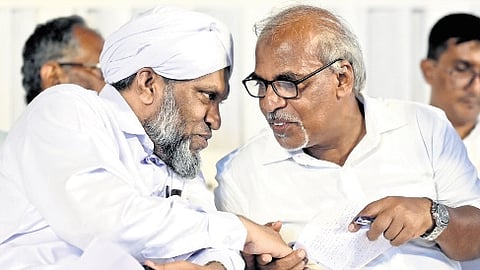

KOZHIKODE: The Waqf Tribunal in Kozhikode, headed by judge Rajan Thattil, has postponed hearing on the contentious Munambam land dispute to December 6.
The case, centered around the classification of 404 acres of land as waqf property, stems from an appeal filed by Farook College, Kozhikode. The college is challenging the Kerala State Waqf Board’s decision to list the land under its registry, asserting it was a gift deed to it from the late Mohammed Siddeeq Sait.
The Waqf Board maintains that the land was alienated without requisite approval, a claim supported by Sait’s descendants, who have also approached the tribunal seeking to reclaim the property. In response, the college managing committee, functioning as the mutawalli (trustee), filed a separate petition contesting registration of the land as waqf property.
The dispute has drawn broader attention, with the state-level Waqf Protection Committee and the family of Sait, seeking to join the case. Community leaders, including representatives of the Indian Union Muslim League (IUML), have initiated dialogues with the Latin Catholic Church and local stakeholders to defuse the issue, which has taken on communal undertones.
At the same time, the Waqf Protection Committee has raised serious allegations regarding the sale of Munambam land by the Farook College management association, terming it “illegal” and against the principles governing waqf property.
Speaking to mediapersons in Kozhikode, committee office-bearer Altaf asserted that waqf land is protected under Islamic law and cannot be sold or transferred.
Altaf said the Munambam land is clearly recognised as waqf property, a designation formalised by the Waqf Board in 2019 when it was entered into the official Waqf register. The status was also recorded at the sub-registrar’s office, ensuring legal acknowledgement of its protected nature. Altaf also accused the college management of failing to clarify its stance publicly, even amid growing concerns.
He also alleged encroachment of other waqf land belonging to the college by private parties, suggesting that the issue extends beyond a single transaction. The case has broader implications for the management and protection of waqf properties in Kerala.
Critics argue that the sale of waqf land, if permitted, could set a worrying precedent, undermining the sanctity of such properties and the trust of donors who contribute land for charitable and religious purposes. On Friday, the INL state committee convened a waqf summit in Kozhikode.